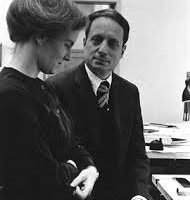A Guy Romancing with Breathless Chutzpah
At the heart of Adelle Waldman’s deliciously infuriating debut novel, The Love Affairs of Nathaniel P., lies a deeply political, sexual question: What’s a liberal, P.C. dude to do when his sexual proclivities conflict with his feminism?
If you’re a single, straight woman living in New York, there’s a good chance you’ve dated a guy like Nathaniel Piven: good-looking (but not intimidatingly so), sharp-witted, on the cusp of professional/creative success, with a standard of domestic hygiene that can best be described as “Bar Mitzvah Boy Gone Wild.”
Nate swoops into and out of the lives of the women he romances with breathtaking chutzpah. The novel begins with an encounter with Juliet, a woman Nate briefly dated, accidentally impregnated, assisted in procuring an abortion — and then promptly forgot. Juliet begins remonstrating him (“You could have at least — ” she says, exasperated), sending Nate and his “clamorous conscience” into a spiral of narcissistic over-analysis. “Could have at least what?” he wonders, as he proceeds to a dinner party at the home of Elisa (his ex-girlfriend), recounts various doomed love affairs, and woos the sensible, clever Hannah.
Nate is an astute (if somewhat priggish) observer of the Brooklyn literary set he aspires to conquer, and being immersed in his mind is, at first, a refreshing, guilty pleasure: Memoirists aren’t real writers! Do-gooders are annoying! Reusable shopping bags are wussy! Emboldened by a generous advance on his first novel, Nate charms his peers, and the reader, with his brash, combative intellect.
But the red flags are there, strategically planted by Waldman to draw our attention to Nate’s niggling hypocrisies. Women are unquestionably “capable of rational thought,” the question is whether they’re interested in it. In a “Men Are from Mars, Women Are from Venus” world, this position is almost forgivable. After all, Nate really, really likes women! (Especially the smart ones, like Hannah, who — gasp — have actually read as much as he has.) It’s just that, well, they do get kinda crazy when you break up with them. Why, Nate quietly rages, do women get so caught up in their feelings?
The irony, of course, is that Nate refuses to acknowledge the extent to which he is caught up in his own feelings. He is adept at self-narration, but not self-awareness, and as a result he routinely hurts people. He says he wants a smart, feminist woman, which is not untrue, but what he really wants is a sexy, conventionally pretty one. The “easy but deep rapport” he has with Hannah, who is a total delight — wry, warm, and smart, without the pretentiousness endemic to their cohort — is no match for his chauvinist ego. In one of several moments of almost-clarity, Nate wonders if he might be “a bit misogynistic.” Well, duh, Waldman seems to being saying from above, rapping his skull.
The book stumbles where it succeeds: Nate’s subtle, pervasive misogyny drives the drama and satire, but, as a result, Elisa and the cast of supporting female characters often feel shrewish and one-note. Hannah and Aurit (Nate’s truth-talking, Israeli feminist friend), however, rise above it through the originality of their ideas and the beauty of Waldman’s dialogue. (One suspects that the author, like Nate, simply likes them more.)
As reviewers who have fallen in love with a book are wont to note, these are minor quibbles. Ultimately, The Love Affairs of Nathaniel P. is a compelling, brilliant satire of modern love: think “Girls” meets Pride and Prejudice meets “Annie Hall.” Protagonists don’t have to be likable — just believable, and, occasionally, sympathetic. By that measure, Nate is a successful hero. You can’t help rooting for him, hoping that someone — his therapist, his girlfriend, his mother — will shake him out of his aggressively rational state of mind into a more menschy state of being.
Elissa Goldstein, social media editor at Tablet. Follow her on twitter, @book_moth.




